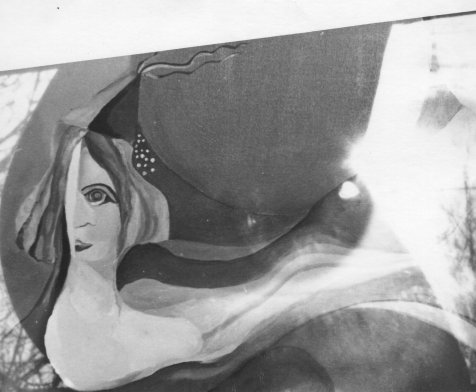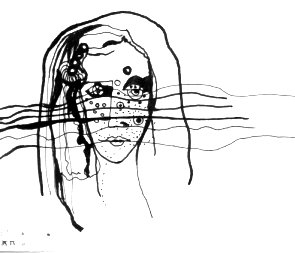"Sails and Winds..."
On sails and winds my wishes all depend,
as on the sea I make my doubting course,
against the Master's and the Westerly's force;
to them the Rising and the Southeast Winds must bend
as must their friends the Greek and the Midmorn,
and these to mighty Cross-Ridge humbly pray
that he may blow more favorably their way
and so all five can work for my return.
My love, for you I feel more than I know
that all the worst remains for me to see;
I know more of you when you're far from me.
So I'll compare you to these dice I throw.
The sea will boil like a casserole,
changing its color and its natural state,
to everything upon it show its hate
for lingering a moment, take its toll;
to sanctuary fishes small and grand
will hurry to a hiding place clandestine,
running from the sea that feeds and makes them,
and as a last resort whoosh onto land.
The pilgrims all together make their vows
and promise gifts and waxen offerings;
their fear of death will bring to light those things
that their confessors ne'er the half would know.
In perilous times my thoughts won't stray from you,
but I will pledge to God who's joined our lives
that He may never lessen how mine strives
and that you'll always be in my mind's view.
In death I only fear our separation,
for death anihilates - Love turns to dust;
but then I don't believe that my will's thrust,
by parting, can be turned from its intention.
I'm jealous of your weak desire for me,
if I should die, how soon you might forget,
my joy is marred by nothing but that thought
- tho, while we both live, this can never be:
that after I am dead, your love dies too,
and all our love will be transformed to ire;
if from this world by force I must retire
my pain will be never seeing you.
Oh God! Is there no outer boundary
to love? For there you'll find me all alone,
fearing, trusting everything to come;
will what you will, do what you want with me.
I'm one of those who love to such extreme
that, after love, God's toll will be my life,
but while I live, my heart can't feel such grief
as death with its excruciating pain.
I'm well disposed to all that love may bring,
but Fortune brings nor joy nor pain - I wait,
and wide awake, with no bars on my gate,
my fate will find me humbly answering.
It could be costly, that which I desire,
my hope for it consoles my great misfortune;
I pray to God and ask for no exemption
but that He quickly bring my test of fire.
And then, on faith no one will longer need
to trust how Love, without me still can grow;
Love's power will become my act and show
how my word will be proven by my deed.
|
Veles e vents
Veles e vents han mos desigs complir
faent camins dubtosos per la mar.
Mestre i ponent contra d'ells veig armar:
xaloc, llevant, los deuen subvenir,
ab llurs amics lo grec e lo migjorn,
fent humils precs al vent tramuntanal
que en son bufar los sia parcial
e que tots cinc complesquen mon retorn.
Amor, de vós, jo en sent més que no en sé,
de què la part pijor me'n romandrà,
e de vós sap lo qui sens vós està:
a joc de daus vos acompararé.
Bullirà el mar com la cassola en forn,
mudant color e l'estat natural,
e mostrarà voler tota res mal
que sobre si atur un punt al jorn.
Grans e pocs peixs a recors correran
e cercaran amagatalls secrets:
fugint al mar on són nodrits e fets,
per gran remei en terra eixiran.
Los pelegrins tots ensems votaran
e prometran molts dons de cera fets:
la gran paor traurà al llum los secrets
que al confés descuberts no seran.
E en lo perill no em caureu de l'esment,
ans votaré al Déu qui ens ha lligats
de no minvar mes fermes voluntats
e que tots temps me sereu de present.
Jo tem la mort per no ser-vos absent,
per què amor per mort es anul.lats,
mas jo no creu que mon voler sobrats
pusca esser per tal departiment.
Jo só gelós de vostre escàs voler
que, jo morint, no meta mi en oblit.
Sol est pensar me tol del mon delit,
car, nos vivint, no creu se pusca fer:
après ma mort, d'amar perdau poder
e sia tots en ira convertit.
E jo, forçat d'aquest món ser eixit,
tot lo meu mal serà vos no veer.
Oh Déu, ¿per què terme no hi ha en amor,
cap prop d'aquell jo em trobara tot sol?
Vostre voler sabera quant me vol,
tement, fiant, de l'avenidor!
Jo son aquell pus extrem amador
apres d'aquell a qui Déu vida tol:
puix jo son viu, mon cor no mostra dol
tant com la mort, per sa extrema dolor.
A bé o mal d'amor jo só dispost,
mas, per mon fat, fortuna cas no em porta:
tot esvetlat, ab desbarrada porta,
me trobarà faent humil respost.
Jo desig ço que em porà ser gran cost
i aquest esper de molts mals m'aconhorta;
a mi no plau ma vida ser estorta
d'un cas molt fer, qual prec Déu sia tost.
Lladoncs, les gents, no els calrà donar fe
al que amor fora mi obrarà:
lo seu poder en acte es mostrarà
e los meus dits ab los fets provaré.
|

